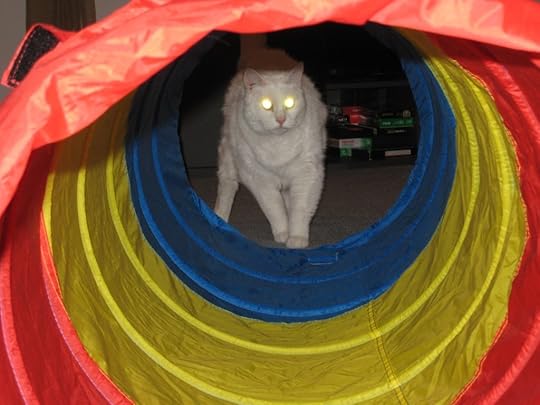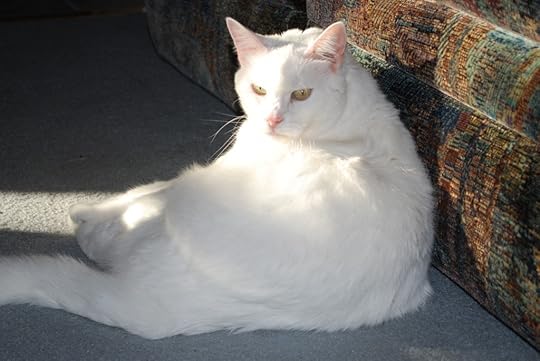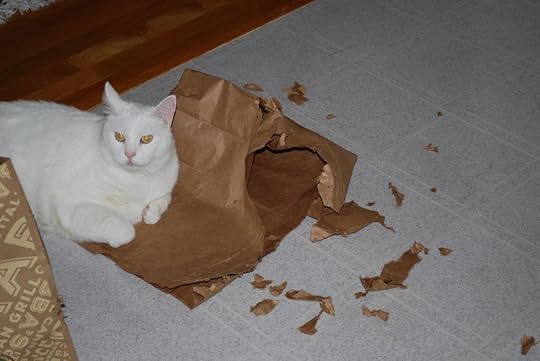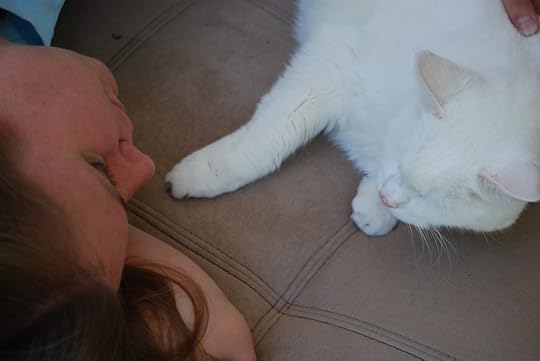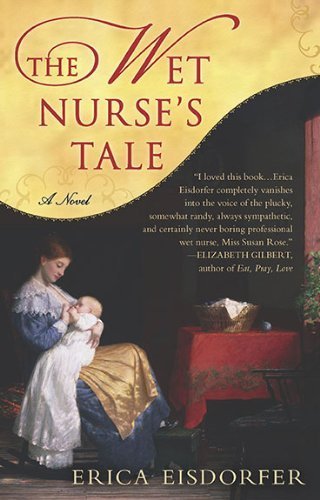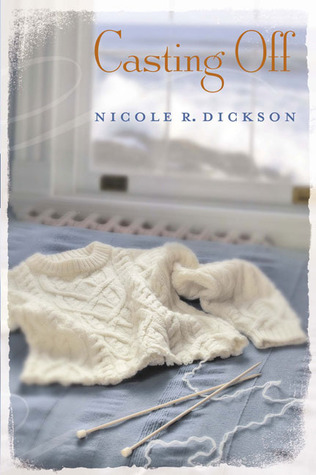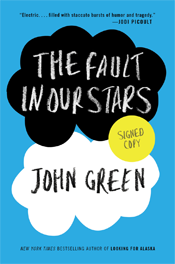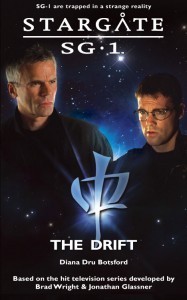Jen Brooks's Blog, page 2
June 18, 2013
My cat left on a rocket ship
My heart is broken. Three days ago my beautiful, friendly, loving cat went to sleep forever. Two days before that our local vet had diagnosed him with cancer. My four-year-old son was with me when I got the news. I burst into tears, then had to explain to my son why I had just broken down in the vet’s office.
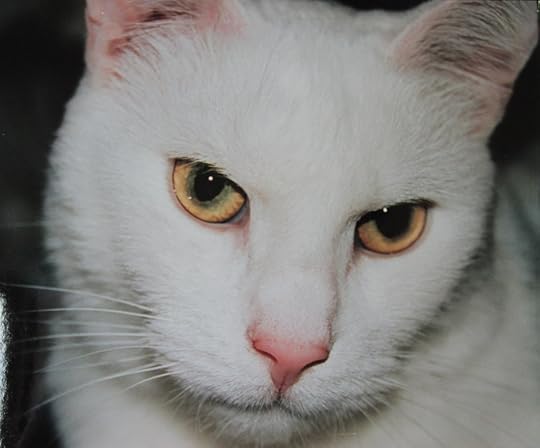 I told him that the Mugga was going to die. Very soon he would leave us forever, and he would go to Heaven. I told my son I was crying because I loved Mugga and would miss him so very, very much.
I told him that the Mugga was going to die. Very soon he would leave us forever, and he would go to Heaven. I told my son I was crying because I loved Mugga and would miss him so very, very much.
“Is Heaven like another Earth?” my son asked. I said yes, it was very much like that, only more beautiful and the Mugga wouldn’t be sick any more.
The next two days between the diagnosis at our vet’s and the confirmation ultrasound at the big veterinary hospital were horrible. My cat still wouldn’t eat. I mourned him already. So many times in my life, when I had a day that left me in tears, it was my kitty who sought me out to snuggle and purr and console me. Those last two days I was crying over him, and I could see his little ears turning in my direction, and I felt awful to be needing him just as he was needing me more.
The final morning, I awoke at 4:44am. Normally the Mugga slept with us, but for the last few nights he had not come upstairs. In the end, this was how I knew he really was in trouble. So on that morning, I snuck downstairs with my comforter and my pillows, picked Mugga up from the dining room rug, and put him on the ottoman beside me on the sunroom couch. He let me pet him a little, then shifted position away. I shifted over with him. When he shifted again, it was to plop his body against mine, just like he used to all his life but hadn’t done in a while because he was sick. I petted him, and I put my ear to his belly to hear his weak little purr, and we watched the sun rise together while we looked out at the new garden in the back yard. Somewhere in there I fell asleep for a little bit, and my kitty stayed right there, curled up against me. I didn’t know it was the last morning we would ever spend together. I wonder what he knew.
At the vet hospital later that morning, my husband, my son, and I were in the special room saying our goodbyes. The vet’s ultrasound had not only confirmed an orange-sized tumor in his belly, but had also found two other large tumors in his liver and spleen and a whole bunch of nodes everywhere. The cancer was causing fluid to accumulate in his belly. Nothing could be done, and he was suffering. He had been suffering for a while, and I am still dealing with the guilt of not listening carefully enough to my cat to know how much pain he was already in.
My son petted the Mugga for the last time and asked again about Heaven being a new Earth. We repeated that a new Earth was a good way to think about it. “Is the new Earth in outer space?” he asked. Between sobs we said it probably is. “Will he take a rocket ship to get there?” We told him we’d ask the doctor to make it so (and later I really did ask the technician if she could find a rocket ship; she said she would arrange it). Then my mom took my son away while my husband and I said a long, loving goodbye to our family member of 15 years.
He had always been a vigorous groomer, so we’d been sad all morning that he wasn’t giving even weak kisses. Right before the catheter went in his leg, I put my fingers to his nose to ask for a kiss. In his final act, he put out his little tongue and touched my fingers. I don’t know if it was instinct, or love, or his generous heart still trying to comfort me when I was sad, but it was the most beautiful thing he could have done for me. When the Mugga was gone a few minutes later, I picked up a tuft of hair he had shed in all that final petting. I’m keeping it forever as my keepsake of his final kiss, his final gift to me.
In the days since I’ve been beating myself up over what I could and should have done for the Mugga. I don’t know how much longer I’ll be grieving so intensely, but one thing that helped a little was to read some blog posts others had written about their cats’ deaths. A number of their fond memories echo so many of my own, so for my sake and my sake only, and because I want to remember all of Mugga’s life, not just the last few days, I’m going to recount my memories below. Thinking back, talking to friends and family who knew the Mugga, and looking through pictures has revealed to me that my cat did very much have stages of his life. And we loved each other through all of them.
My son and I have been picking up tufts of his hair around the house and calling them kisses and hugs the Mugga left behind because he loved us.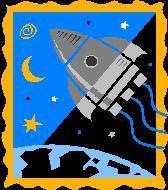
I miss you, Mugga-doo. Safe journey, my forever friend.
MY MEMORIES
Mugga came into my life because I was mourning the loss of another cat, Kitty. My family thought it would help me to move on if I had another cat to love. I wasn’t so sure, but that was what my family wanted to give me for my birthday present. We went to the shelter to rescue a cat.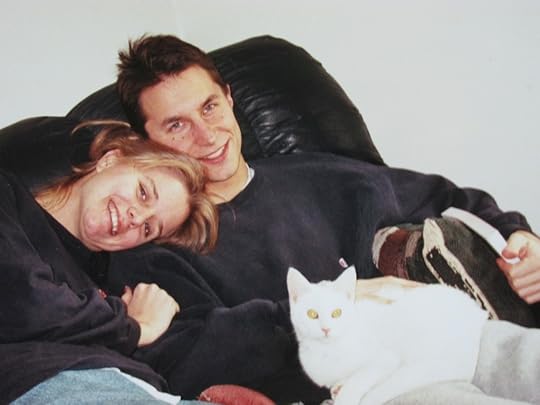
The Mugga was one of a litter of white-haired kittens. We picked up a few of them, but the Mugga (whose given name was “Marshmallow” and was officially so for his whole life. It was my husband who coined the nickname the “Mugga”) was undeniably friendly, scrambling for love and attention. We took him home.
My husband and I were engaged at the time, and somehow we figured out that Mugga had been born in June (it was, at that time, November). We were to be married the following June, so we decided the Mugga’s birthday would be in June, on our anniversary, more or less. So he was one year older than our marriage.
Mugga first lived with us in a third-floor apartment with locked outer doors in Woburn, right on Montvale Ave. near where it intersected with Main Street. For these reasons, we decided to keep him safe as an indoor cat.
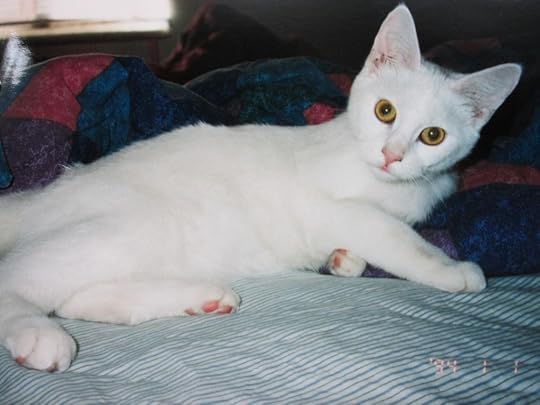 Every time we opened the door to our apartment, he would try to sneak out. One day we let him go and shut the door behind him. I think we forgot he was out there. Later we found him curled up waiting outside our neighbor’s door, mistaking it for our door.
Every time we opened the door to our apartment, he would try to sneak out. One day we let him go and shut the door behind him. I think we forgot he was out there. Later we found him curled up waiting outside our neighbor’s door, mistaking it for our door.
We used to let light reflect off the faces of our watches and make moving light circles on the walls and furniture. The Mugga used to chase the light. I think we have video of this somewhere—him jumping up the wall like a crazy cat.
I had (and still have) a few plants in large pots. The Mugga used to pee in the dirt. Although I’d forgotten this, my friend remembers I’d put cereal boxes in the plants to keep the kitty out.
He also ate plants. This was a constant throughout his entire life. We had to keep poisonous plants out of his reach so he didn’t get sick and other plants out of his reach so he didn’t destroy them. He often found ways to reach what we thought was unreachable.
We moved into my parents’ basement from the apartment in Woburn when my husband went back to school. Mugga used to sit on the wide window sills and chatter at the birds outside.
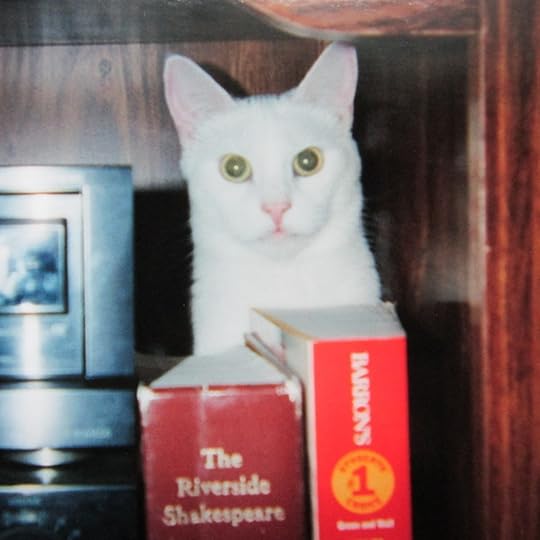 Because my parent’s house is on something of a corner, car headlights used to shine in the windows when they went by in the dark. In the early mornings before rush hour, Mugga used to chase the headlights on the wall. More than once he jumped up to catch the light and ended up flicking on the lights in the bedroom, waking us up.
Because my parent’s house is on something of a corner, car headlights used to shine in the windows when they went by in the dark. In the early mornings before rush hour, Mugga used to chase the headlights on the wall. More than once he jumped up to catch the light and ended up flicking on the lights in the bedroom, waking us up.
From my parent’s basement, we moved into our first house. At night we would sit together on the couch and eat and watch TV. I had (still have) a yellow puff (my word for a comforter) that I would put across my lap. The Mugga used to come snuggle up on that yellow puff every day with me.
In that house we had a two-story foyer with a coat closet on the left. The closet had hardwood flooring on the top. It was outside the bannister railing for the staircase, so you could only get on top of the closet by climbing over the railing (dangerous) or going through the railing (only possible for a cat). The Mugga used to perch up there and monitor the goings on of the entire house.
One time we went away and left the Mugga alone. Although it had been a long time since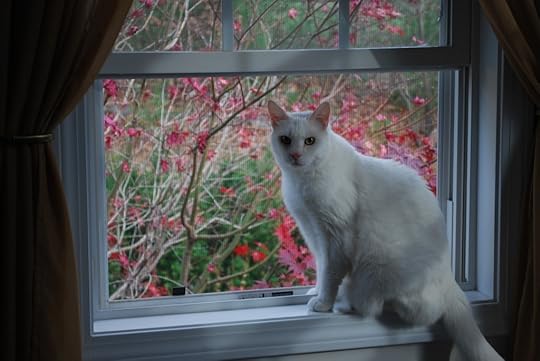 he peed in a plant, we came home to dirt all over the floor and an ammonia smell in the pot. We then discovered the bathroom door had been closed while we were gone, and the Mugga had no access to his litter box. We wondered how long the poor thing had held out before finally using the plant.
he peed in a plant, we came home to dirt all over the floor and an ammonia smell in the pot. We then discovered the bathroom door had been closed while we were gone, and the Mugga had no access to his litter box. We wondered how long the poor thing had held out before finally using the plant.
When I was pregnant with my son, I did not start the new school year in my teaching job. I was at home for that fall, and I had a routine where I would go upstairs to bed and take a nap every morning. The Mugga always trotted along up with me and slept with me.
While pregnant, there got to be less and less room on my lap with the yellow puff. Mugga would crawl up anyway and snuggle against my belly. I think he liked being near the baby and his movement and his heartbeat.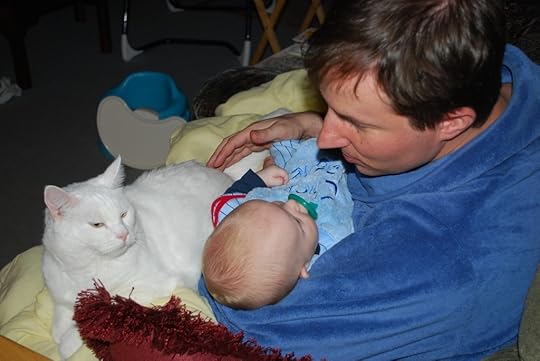
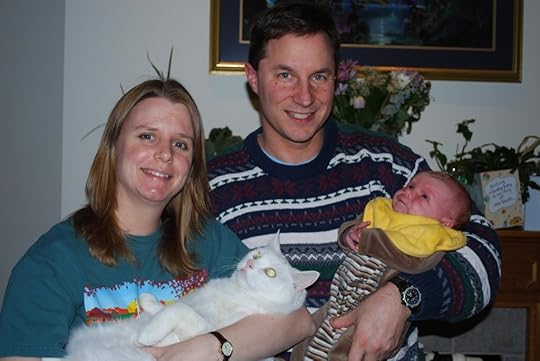 We didn’t know how the Mugga would react to the birth of our son, but we needn’t have worried. He loved and sniffed and generally wanted to hang around our son for the entire four and a half years they were together. I remember one night in particular (I’m skipping ahead here because this was in our current house, not our first house, only a few months ago) I was awakened in the night by the Mugga sitting on the pillow above my son’s head (my son still sleeps with us), grooming his hair with gusto.
We didn’t know how the Mugga would react to the birth of our son, but we needn’t have worried. He loved and sniffed and generally wanted to hang around our son for the entire four and a half years they were together. I remember one night in particular (I’m skipping ahead here because this was in our current house, not our first house, only a few months ago) I was awakened in the night by the Mugga sitting on the pillow above my son’s head (my son still sleeps with us), grooming his hair with gusto.
I actually don’t remember when it started, but the Mugga used to sleep on/by my head. He’d always be trying to sneak in good grooming of my hair, but I never liked him to do it.
By contrast, my husband let him lick his head, as long as it wasn’t when he was trying to sleep. In our new house, my husband gets up for work before my son and me. When the alarm went off, the Mugga used to get excited because after my husband’s shower and dress, he would say a special goodbye to the Mugga by letting him groom his head.
The final phase of my cat’s life was in our new home where we’ve lived for a little over two years. He slowed down. He didn’t chittery and chattery as much at the birds. We were busy with our growing son and didn’t sit on the couch anymore with the yellow puff. Instead, my best time with the Mugga was always at night. As an insomniac, I often fall asleep last and wake up often. I would snuggle with the cat during those times when the house was dark and quiet and my son and husband breathed softly beside us. Sometimes I petted him just once because I wanted to fall back to sleep, sometimes a little longer. For a while he slept on a pillow I placed above mine. After that he slept at my feet or my husband’s. Or sometimes cuddled up warm against me.
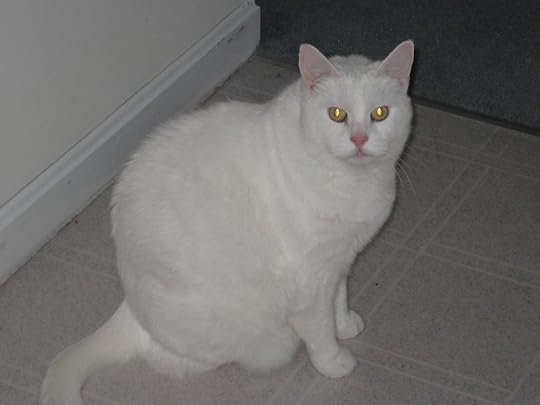 Our days in the last few years were defined by 8:30. In the morning and the evening, that was when we had to feed the Mugga and give him his insulin. It’s so hollow now to see 8:30 on the clock and have no date with the Mugga anymore.
Our days in the last few years were defined by 8:30. In the morning and the evening, that was when we had to feed the Mugga and give him his insulin. It’s so hollow now to see 8:30 on the clock and have no date with the Mugga anymore.
Two nights ago I got up in the night to use the bathroom. I felt like his little footfalls were supposed to follow me into the bathroom. I’d forgotten how often he used to do that, since he hadn’t done it in a while. For years he used to follow me at might to get some love.
There was white cat hair everywhere. It’s still everywhere. We couldn’t get dressed without having to check for cat hair. 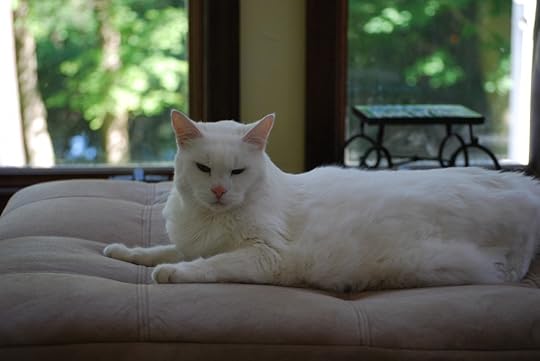
That last morning watching the sunrise, and that last afternoon on the leather couch at the vet’s.
How he used to meow before he threw up a hairball, and how every time he did throw up, he did it in threes. If I found one small puddle, I knew to look for exactly two more.
How, in our new house, when it was time to eat, he would wait at the top of the stairs for us to come and carry him down. He let us cradle him when we held him. He was our first baby, after all.
The way, before he got diabetes, he would love his Fancy Feast cat food, and how afterward, as it approached 8:30 he would, as we said, “advocate” for himself by seeking us out and letting us know he was ready.
He was always his own best advocate, not just with feedings, but with love. He used to make a place for himself near us, like if one of us was holding the baby, he would sit just a little further down the lap, or on top of the chair by our head.
He had golden eyes.
When he was very little he had a tuft of gray hairs on his head that eventually grew out.
If we went away overnight, he got so lonely. He’d cry at us when we got home and be extra special needy for attention. I used to think about him and worry about him every time we went away.
How he used to love sitting in a sunbeam, especially in younger days.
Sometimes he’d do a “drive by,” where he reached out with his claw and grabbed you as you walked by.
How he cowered during a thunder storm, most recently in our closet.
He once got shut in our coat closet. We didn’t find him until we went looking. Later I caught him opening that closet himself and realized he must have opened it the day he got stuck and someone just came by and shut it without knowing he was inside.
He used to visit our overnight guests and sleep with them for part of the night.
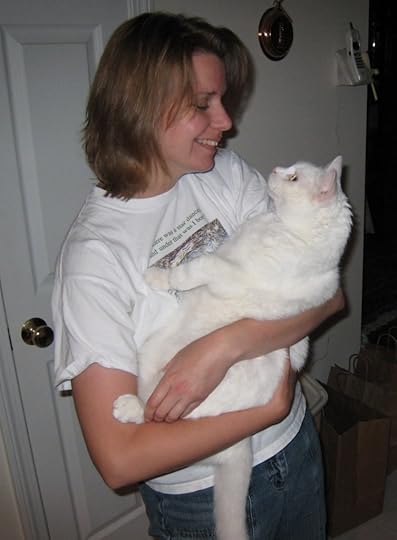 He had his favorite places to hang out. Not only over the closet in our first house, but in our new house under the dining room table. There is almost enough hair under there now to make a new cat. Though sometimes I’d find him in new places like the wicker chair in the sunroom.
He had his favorite places to hang out. Not only over the closet in our first house, but in our new house under the dining room table. There is almost enough hair under there now to make a new cat. Though sometimes I’d find him in new places like the wicker chair in the sunroom.
A few times, when I had the chance at night to work on the computer in the playroom by myself, he would come in and sit beside me on the rug.
In younger days, he would unroll the toilet paper. To save rolls, for years and years we hung them backwards.
He liked being stroked on his jaw and under his chin.
The way he meowed in the car. He could keep it up for the hour-long drive from our first house to my mom and dad’s house.
Before showering, I put the clothes I’ll need afterward on the bed. When I would come out of the shower, the Mugga would be nesting in my clothes.
We used to tease him by making shrill noises, especially shrill singing noises. His ears would perk straight up.
His fur was soft. Very, very, soft.
Even as my son grew from an infant to a toddler to a very active pre-schooler, the Mugga loved him. When my son was loud and crazy, the cat kept his distance, and when my son poked and pawed him, the cat could bite or scratch. But in quieter moments, he’d come and sniff and snuggle and groom, and my son was just getting to the age where he could appreciate the cat and pet him properly.
What I remember most about the Mugga, what was most special and most wonderful about him, what will always define him in my life, is that he was always there for me, unconditionally, until he kissed me with practically his dying breath.

May 23, 2013
When ideas keep coming
 About two weeks ago I went downstairs to get some popcorn for movie watching with my family. Halfway between the fridge and the pantry I got whammed by an idea for a new novel. The concept, the ironic ending, the words of the protagonist all formed in the time it took me to open the pantry and pull the popcorn bag out.
About two weeks ago I went downstairs to get some popcorn for movie watching with my family. Halfway between the fridge and the pantry I got whammed by an idea for a new novel. The concept, the ironic ending, the words of the protagonist all formed in the time it took me to open the pantry and pull the popcorn bag out.
I’m guessing most writers love when things like that happen, but it was a little inconvenient for me. You see, I’m already working on two other novels.
I never thought I’d be one to enjoy splitting my focus like this, and the truth is, I guess “enjoy” really isn’t the right word. What I’m doing is necessary. Most writers know how it feels to reach a point where you have to force yourself to work, where the ideas just don’t flow magically out your fingertips onto the keyboard. I was at that point while waiting for World Maker to go on submission, and my solution was to split my focus to relieve the pressure of committing to one thing other than World Maker while I stayed stuck in my World Maker headspace.
But World Maker itself is a product of a period of forced writing (a page a day!), so I know that discipline can yield results for me. The trouble is that of the two manuscripts I’d been juggling, one is a rewrite of the manuscript I finished before World Maker, and the rewrite is basically being done for voice and characterization, which is not something you can fix with a few turns of phrase. This intimidated me, which is why I started the new project, and then got caught up on all the historical research I needed to do for it.
So far, my pattern has been to issue myself a challenge with every new manuscript. With manuscript #1 (Prosorinos) the challenge was to finish. With manuscript #2 (Wishstone) it was to write a fantasy. (Until that point, I had strictly considered myself a writer of adult science fiction). Then manuscript #2 was rewritten as a young adult story (which still needs work, hence the revision for voice and character). Then with manuscript #3 (World Maker) I set out from the start to write a YA, using appropriate voice. Now with manuscript #4 (Jewelry) the challenge is to use an ensemble cast. Manuscript #5 (untitled, maybe The Getting Popcorn Book) isn’t asking me to jump into something new plotwise or artwise, so maybe its challenge is to get me to make serious progress on more than one novel at once.
Did you keep all those titles straight in that last paragraph? See how juggling multiple manuscripts feels?
Still, it’s pretty exciting to have so much writing complete and so much that’s ready to come out. There was a period of time in my writing life when I wasn’t sure if I’d ever get another good idea. Now I’m confident that no matter which of my novel ideas I focus on I can get to “The End” in a matter of a few months. World Maker, having been written in four months, gave me that confidence.
I think for now I’ll make progress a little bit at a time on three different projects. If World Maker sells, I’ll do some consulting to determine which project to finally drop everything else for.
Do you ever work on more than one project at once? Any tricks you want to share?

April 3, 2013
Getting to know a new book
When you begin reading a book, what do you need in the first few pages (or paragraphs, or sentences) to get you to keep reading?
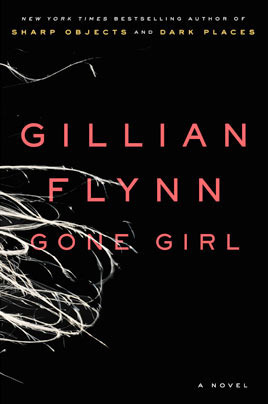 I finished reading Gillian Flynn‘s Gone Girl the other day. It’s a highly acclaimed, very popular book and was recommended to me by several people whose opinions I trust. I found the opening intriguing, right from the first sentence: ”When I think of my wife, I always think of her head.” (And, of course, those opening three paragraphs take on a totally different tone after having read the book.)
I finished reading Gillian Flynn‘s Gone Girl the other day. It’s a highly acclaimed, very popular book and was recommended to me by several people whose opinions I trust. I found the opening intriguing, right from the first sentence: ”When I think of my wife, I always think of her head.” (And, of course, those opening three paragraphs take on a totally different tone after having read the book.)
Yet I had a hard time getting into it at first.
For me, this is not unusual. Looking over the list of books I’ve read recently, I see my pattern is the same:
1) I start out with a book that has been recommended to me in one way or another.
2) I read the first few pages one night just before bed.
3) I may read a few more pages the next night.
4) Maybe a few more pages the next night.
5) I stop reading for, like, a week.
6) I pick up the book again, trying to remember what was happening when I left off.
7) I finally get into the book and read like crazy to the end in a day or two.
Starting a new book, for me, is a ton of work. Just like it’s work to get to know a new friend or colleague, it’s work to get to know a new character. It’s work to get to know a new world, especially if the world is different from this one (and I often read fantasy/science fiction). I have to find something very valuable in the beginning of a book to make me want to do that work.
For me, that something is usually the quality of the prose itself. I felt right from the start of Gone Girl that Gillian Flynn is skilled with words, and that gave me faith that she would also be skilled with story. It helps to have had the book recommended because that tells me others have found the story worth reading to the end.
The other thing that will keep me reading is if I feel I’m about to read something truly original. Even if I’m reading a story with a “traditional” or “genre formula” plot, if something in the beginning makes me feel I’ve never read something quite like this before, I’ll keep going.
In how-to books and classes on writing, writers can find so many “rules” for writing a good opening: posing a question, a strong character’s voice, an in medias res action sequence, etc. For me, these things can be important, not so much to get me to the end of the book, but to get me more quickly over that hump of work in the beginning. But I won’t bother with the hump unless I am already hooked by the prose and the originality.
For the record, I loved (despite being disturbed by) Gone Girl. I bought it at the bookstore because it was recommended to me, and I can whole-heartedly recommend it to you. :)

March 11, 2013
“Up” ending or “down” ending?
Sometimes predicting an ending isn’t hard. When you’re reading a book (or watching a movie) within a certain genre, for example, you know the romantic male lead and romantic female lead will get together, or that the evil sorcerer will be defeated by the reluctant hero, or that the detective will solve the murder case. What you often don’t know is how that ending will come about. One oft-quoted piece of advice I received in graduate school is “Give the audience what they want, but not in the way they expect.”
There is a difference between knowing that the hero of a story will triumph and knowing how that triumph will come about. There is usually a crisis moment close to the end when the outcome is supposedly in doubt—even though you know things will eventually be okay (or not okay, though “up” endings are way more common than “down” endings). I LOVE, LOVE, LOVE when a book can deliver an “up” ending or a “down” ending that I know is coming, but in a way that truly surprises me, and that doesn’t happen very often.
However, I VERY RARELY near the end of a story truly not knowing whether the ending will be “up” or “down.” Last night I finished reading another book from one my agent’s clients. (The Wet Nurse’s Tale by Erica Eisdorfer, and there are some plot-point spoilers below, though I’ve tried to be vague enough not to really spoil anything) The main character mentions somewhat early on that she might have just given up at the start if she’d known the horror of what the future would bring. This is pretty obvious foreshadowing, but left me wondering if she meant the horror leading up to an eventual “up” ending or the horror of a “down” ending. At stake was the life of a child.
As the pages turned and fewer and fewer chapters remained, the story turned quite dark, as stories often do when they approach the climax. All kinds of clues got dropped that the antagonist in the house would bring about the death of the child. There were precedents. There was an “accident” and a disastrous outing. There was violence done to another character. The main character speculated on how the antagonist would kill the child. The main character devised a plan to save the child in which the child would be alone with the antagonist for a short time. On top of it all, the main character several times stated how beautiful the child was and how happy the child made her (and I think we all know a super-loved/needed character often dies at the moment they are loved/needed the most). At the same time, though, the tone of the book and the voice of the main character indicated that things would turn out okay. Although I suspected tone and voice would win out, I really wasn’t certain. I mean REALLY wasn’t certain. I can’t remember a book I’ve read where the outcome was that much in doubt for me, and I worried. Ever since my son was born I’ve had a really hard time reading about the death of a child. I didn’t want the ending to turn out badly. Then I wouldn’t be able to sleep for days and days.
Well, I’m tired today. But, dear Reader, I’ll leave you guessing whether it’s because of the book’s ending or because of the recent change to daylight savings time . . .
Disclosure: I am in the process of reading books by other authors on my agent’s client list. This is how I came to read The Wet Nurse’s Tale. To be clear, I have not been asked to promote, nor is it my purpose to promote this book other than to say I found in it a great example of an important writing principle. :)

January 29, 2013
A beautiful pay-off: Nicole R. Dickson’s Casting Off
I just finished reading a book that had a remarkably powerful pay-off for me: Nicole R. Dickson’s Casting Off. The story is about a single mom who is six years past being in an abusive relationship. She’s still struggling to find herself, to find security, to find “home.” She thinks she’s spending a summer on a tiny Irish island to study sweaters using a research grant, but of course it ends up she’s really there to change her life.
The pay-off in any novel is only as powerful as the layering of promises and expectations that go into the making of it. In the case of Casting Off, Dickson layers in chapters showing the protagonist’s anxiety and chapters showing the secondary protagonist’s misery. She also takes pains to show how each sweater knitted on the island is done in special patterns that reflect the life of the person who will wear it. Likewise, the sweaters are shown in several cases to be instrumental to the wearer’s well-being. All of this crafting, and more, had to be done to produce the pay-off.
I wish all of you had read this novel so I could just blurt out the details of the scene I found so touching, but since I don’t know who of you has read the book, I won’t give spoilers. I will say that the truth revealed in the scene was expected and unexpected and so beautiful it made me cry for the rest of the book.
If you have a completed manuscript and want to see if your pay-off has been layered properly, there are many ways to go about it. One pretty basic suggestion I can give is to exchange manuscripts with another writer, but make sure each of you leaves out the pay-off part. The pay-off is the scene that your novel builds to. It is usually the climax of the book. (I will confess that in the case of Casting Off, others might identify the climax as coming in a scene after the scene I adore.) The pay-off is the delivery of the promise you made to the reader at the beginning of your book and then built upon in the middle.
So you take your manuscript with the pay-off missing and have your writer-friend read it while you read your writer-friend’s manuscript that’s missing its own pay-off. Each of you should write down what you think is in the missing pay-off and give examples from the manuscript that have created this expectation. Then, share your thoughts. It will be interesting for you to hear whether your writer-friend’s guesses are accurate, but it will be just as helpful for you to see if your own guesses are accurate about your writer-friend’s story. Once you have exchanged guesses, share the real endings and discuss how they met or didn’t meet your expectations and what each could do to strengthen the pay-off. Armed with new insight, you then go back through your manuscript and develop the parts that need developing for a great pay-off.
And you could read Nicole R. Dickson’s Casting Off, if you want an example of a novel that does pay-off well.
Disclosure: I am in the process of reading books by other authors on my agent’s client list. This is how I came to read Casting Off. To be clear, I have not been asked to promote, nor is it my purpose to promote this book other than to say I found in it a great example of an important writing principle. :)

December 17, 2012
Reading John Green’s The Fault in Our Stars
In the past 24 hours I have been a-flurry with thoughts about YA literature, mostly because I had two significant reading experiences. The first is the YA novel by John Green, The Fault in Our Stars, which I finished last night. The second is an article in NCTE’s Council Chronicle (Volume 22, No. 2) titled “YA Literature—Where Teens Find Themselves” by Lorna Collier, which I read this morning.
Originally I wanted to write this post about Green’s novel, about how wonderful it is and what ideas I have for reading it together with a classroom of high school students. But while I considered my topic over breakfast, I read the NCTE article and found these quotes particularly relevant:
From Don Gallo, ALAN (Assembly on Literature for Adolescents of NCTE) co-founder:
“There are some schools where no teacher even knows about YA lit . . . You ask, ‘What do you think about young adult literature?’ and they say, ‘Oh, we don’t teach that crap here.’ That’s been an attitude of some English teachers since forever. There are school districts where YA is used in middle school but not high school because ‘in high school we do the REAL literature.’”
From Robert C. Small, past ALAN president, quoted from a 1986 article published in NCTE’s English Journal:
“These are works of literature [from a list including Judy Blume, Robert Cormier, etc.] even in the narrowest and most conservative sense. They have serious intent, careful craftsmanship, effective expression, and other qualities that make literature literature.”
Essentially, the point I took away from this article is that many teachers don’t teach YA literature because they think it isn’t valuable in a classroom.
Do teachers really think this? The article didn’t cite any specific research, and I didn’t do a search for such research before writing this. What I do know for certain is that I didn’t include young adult literature in my classroom for many years.
Why didn’t I? First and foremost, I was completely unfamiliar with it. By the time I started teaching, my last encounter with young adult literature had been junior high school, when I was primarily concerned with questions of love and popularity. As I moved into high school I became a strictly adult book reader.
I went to high school in the late 80s, in a time when YA literature was not the same as it is now. That’s not to say YA lit of the 80s wasn’t valuable or important, there just wasn’t the huge volume and variety there is now. I wonder if I were an adolescent today if I would have a greater or lesser interest in YA books, and I wonder if young teachers today who were raised in a world of such books are more likely to teach them.
When I started teaching, I did not look down my nose at YA literature. As I said, I just didn’t know a thing about it. My teacher preparation program hadn’t exposed me to the latest and greatest works of YA lit, and no one in my new English department was teaching it. Although I don’t know this for sure, I don’t think a single English teacher in my department in the mid-90s had a classroom library with numerous new releases. I don’t say this to be critical. I don’t think they had any better idea what was new in the YA publishing world than I did, and I was fresh out of college.
The truth is that I didn’t really get interested in YA literature until I attended a BER workshop titled “What’s New in Young Adult Literature.” I was looking for professional development points in order to renew my teaching license, and it seemed about time for me to really learn about what my students were reading when I wasn’t assigning Frankenstein or Romeo and Juliet. This coupled with my growing interest in a writing career put me on the path to developing a classroom library that sought to keep up with YA lit as it was being published.
It might seem obvious to you, if you are not an English teacher, that it’s important to keep up with the real world of books, but it’s not always so obvious to an English teacher. We are trained to teach the canon. We are trained to teach literary analysis, the five-paragraph essay, and (sometimes) grammar.
My own experience was that the more familiar I became with the actual real world of book publishing, and the more I understood and read the books my students were reading, and the more I could share about the professional world of writing (in other words the more I stopped being insulated from my field by classroom walls), the more I felt I could offer my students a glimmer of understanding as to how what-you-do-in-school is relevant-to-life.
There’s something about literature that always feels abstract when you’re a student. Something that makes the big ideas float around in a great mist you can wade through and even glimpse through, but never hold in your hand. The ideas encountered in English classes are universal, but contextual. I feel YA literature is a valid way to provide context for the audience it’s meant to address.
The story of a cancer patient and her romance with another cancer patient, John Green’s The Fault in Our Stars is one book I would use with students at any high school level. It is the kind of literature I wish all high school teachers were using in their classrooms. Although many more teachers are using contemporary YA works today than back in the 90s when I started teaching, I like to think even more would use it if they just read a book like The Fault in Our Stars.
And since this post has become longer than I intended, I’ll leave off with two blurbs from the back of my hardcover edition. I think they pretty succinctly state why I would love to read Green’s book with a group of high schoolers:
“[Green] shows us true love—two teenagers helping and accepting each other through the most humiliating and emotional ordeals—and it is far more romantic than any sunset on the beach.” -New York Times Book Review
“The Fault in Our Stars takes a spin on universal themes—Will I be loved? Will I be remembered? Will I leave a mark on this world?—by dramatically raising the stakes for the characters who are asking.” -Jodi Picoult

October 31, 2012
The Drift
Both of my long-term critique partners have had special news this October. Rhonda Mason completed the draft of a new manuscript (I’ll label it space opera romance for now), and I am SUPER EXCITED to announce that Diana Botsford‘s second novel set in the Stargate universe is releasing today as an ebook! (releasing November 20th in print!) The Drift is the sequel to her first Stargate novel, Four Dragons. If you are a Stargate fan, or even if you’re not, I invite you to check out her work. Diana is a thoughtful writer who understands character motivation, and I really responded to her portrayal of Jack and his inner crisis in this story.
Diana is largely responsible for my return to writing after my own inner crisis. Her example during the writing of Four Dragons really gave me the push I needed to recover my rhythm and confidence as a writer, and for that I will be eternally grateful.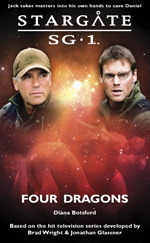
A little while back I posted about the importance of good critique partners. I have been inspired, encouraged and improved in so many ways for having had the blessing of a few good writing buddies, Diana and Rhonda especially.
Congrats, Diana, on the release of The Drift!


